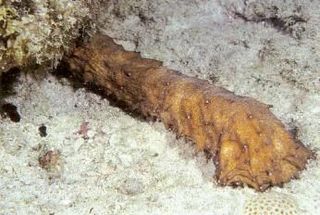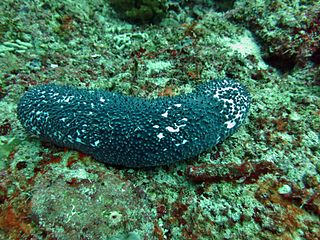
Sea cucumbers are echinoderms from the class Holothuroidea. They are marine animals with a leathery skin and an elongated body containing a single, branched gonad. They are found on the sea floor worldwide. The number of known holothurian species worldwide is about 1,786, with the greatest number being in the Asia-Pacific region. Many of these are gathered for human consumption and some species are cultivated in aquaculture systems. The harvested product is variously referred to as trepang, namako, bêche-de-mer, or balate. Sea cucumbers serve a useful role in the marine ecosystem as they help recycle nutrients, breaking down detritus and other organic matter, after which bacteria can continue the decomposition process.

Holothuriida is an order of sea cucumbers. Taxa within the order Holothuriida were previously classified in the order Aspidochirotida, which was determined to be polyphyletic in 2017. Some taxa were also reclassified into the clades Synallactida and Persiculida.

Holothuria atra, commonly known as the black sea cucumber or lollyfish, is a species of marine invertebrate in the family Holothuriidae. It was placed in the subgenus Halodeima by Pearson in 1914, making its full scientific name Holothuria (Halodeima) atra. It is the type species of the subgenus.
The worm pearlfish is an eel-like fish in the family Carapidae.

Holothuria forskali, the black sea cucumber or cotton-spinner is a species of sea cucumber in the family Holothuriidae. It is found at shallow depths in the eastern Atlantic Ocean and the Mediterranean Sea. It was placed in the subgenus Panningothuria by Rowe in 1969 and is the type taxon of the subgenus.

Holothuria thomasi, the tiger's tail, is a species of sea cucumber in the family Holothuriidae. Although it is the largest sea cucumber known in the western Atlantic Ocean, it is so well camouflaged that it was 1980 before it was first described. It is placed in the subgenus Thymiosycia making its full name Holothuria (Thymiosycia) thomasi.

Bohadschia argus, the leopard sea cucumber, leopardfish, or tigerfish, is a species of sea cucumber in the family Holothuriidae. It is native to the tropical Western Indo-Pacific region.

Bohadschia is a genus of sea cucumbers in the family Holothuriidae. They are among the largest, most common, and conspicuous sea cucumbers on coral reefs. They have large, loaf-like bodies that are often strikingly colored.

Lissocarcinus orbicularis, common names sea cucumber crab, red-spotted white crab, and harlequin crab is a species of crab in the family Portunidae. This species gains one of its names from its close-knit relationship with holothuroids, the sea cucumbers. L. orbicularis should not be confused with L. laevis, a similar species of swimming crab, or Camposcia retusa, both of which are also commonly referred to as the harlequin crab. L. orbicularis displays numerous morphological and social adaptations for feeding and has a large distribution throughout the Indo-West Pacific.

Holothuria leucospilota, commonly known as the black sea cucumber or black tarzan, is a species of marine invertebrate in the family Holothuriidae. It is placed in the subgenus Mertensiothuria making its full scientific name Holothuria (Mertensiothuria) leucospilota. It is the type species of the subgenus and is found on the seabed in shallow water in the Indo-Pacific.

Actinopyga echinites, commonly known as the brownfish or deep water redfish, is a species of sea cucumber in the family Holothuriidae. It is native to the tropical Indo-Pacific region and is harvested for food.

Holothuria fuscocinerea, the ashy pink sea cucumber, is a species of sea cucumber in the family Holothuriidae. It is placed in the subgenus Stauropora, making its full name Holothuria (Stauropora) fuscocinerea. It is native to shallow water in the tropical and sub-tropical Indo-Pacific.

Holothuria fuscopunctata, the elephant trunkfish, is a species of sea cucumber in the family Holothuriidae native to shallow water in the tropical Indo-Pacific. It is placed in the subgenus Microthele, making its full name Holothuria (Microthele) fuscopunctata.

Actinopyga caerulea, the blue sea cucumber, is a species of sea cucumber in the family Holothuriidae. Named for its unique blue coloration, this species can be found along the continental shelf of the tropical Western Indo-Pacific region, at depths between 12 and 45 m. It is a commercially important species, and is harvested for food along its range.
Actinopyga agassizii, commonly known as the five-toothed sea cucumber or West Indian sea cucumber, is a species of sea cucumber in the family Holothuriidae. It was first described by German zoologist Emil Selenka in 1867. It is native to the Western Atlantic region, including the Gulf of Mexico and the Caribbean Sea, and is harvested for food.
The Dr. K.K. Mohammed Koya Sea Cucumber Conservation Reserve is a marine protected area located off the coast of the Indian union territory of Lakshadweep, approximately 50 km (31 mi) northwest of the island of Bitra. Formally established by Indian authorities on February 27th, 2020, the reserve covers 239 km2 (92 sq mi) of the Arabian Sea, including parts of the Byramgore (Cheriyapani) Reef, and is the world's first conservation area specifically dedicated to the protection of sea cucumbers.

Actinopyga varians, the Pacific white-spotted sea cucumber or Hawaiian sea cucumber, is a species of sea cucumber in the family Holothuriidae. It is found in the Pacific Ocean near Hawaii and also in the Indo-Pacific Ocean.

Holothuria (Thymiosycia) impatiens, commonly known as the impatient sea cucumber or bottleneck sea cucumber, is a species of sea cucumber in the genus Holothuria, subgenus Thymiosycia.

Bohadschia ocellata, also known as the polka-dotted sea cucumber, is a species of sea cucumber in the family Holothuriidae. It is native to the tropical Western Indo-Pacific region.



















